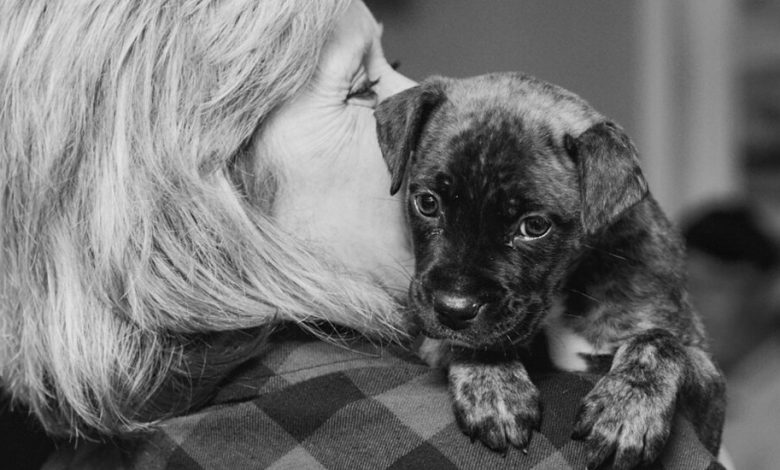What Do Stray Dogs Tell Us About the South?

NASHVILLE — As the documentary “Free Puppies” opens, a fluffy dog named Albert is galloping down a beach boardwalk. His companion, a much bigger dog, is leaping with excitement, but Albert is harnessed into a dog wheelchair. He was found on the side of a road in Arkansas, “either thrown out of a car or hit by a car,” a voice-over tells us. “We brought him up on one of those pet carriers that come up with tons of animals from the South.” Albert’s wheelchair bears a miniature Connecticut license plate.
This little dog is one of millions of pets transported from the American South to places in the Northeast and Midwest with fewer adoptable animals — communities where there are well funded animal-welfare agencies, stricter leash laws, a shorter breeding season and weather harsh enough that fewer strays survive.
Widespread animal relocation began in 2005 in response to Hurricane Katrina, according to Karen Walsh, the senior director of animal relocation at the A.S.P.C.A. “When we saw how many people were willing to step up and help an animal that had lost their home in Katrina, that idea grew,” she says in the film. “Animals started to flow across the country.”
Only a fraction of the needy pets here are cute enough or young enough to be easily placed this way — often based solely on a rescue organization’s website or social media feeds. So “Adopt, don’t shop” has become a national mantra among pet rescue advocates working desperately to reduce the number of animals euthanized in overcrowded shelters or left to starve on their own. Most of those doomed pets live in the South.
“Free Puppies” will be released on DVD — and as video-on-demand on Apple and Amazon — on Dec. 13. The heroes of the film are Monda Wooten, Ruth Smith and Ann Brown, three pet rescuers who live in the area where Alabama and Tennessee share a border with Georgia. Their work to remedy local animal suffering is the narrative lens through which the film considers this regionwide problem.
“Free Puppies” follows the women as they collect unwanted litters; take in strays; persuade people to surrender neglected pets; bathe infested puppies with flea shampoo; even pick up animals from their homes, take them to a veterinary hospital or mobile clinic to be spayed or neutered, and return them to their owners at no charge.
They have cultivated a network of other volunteers to help. For all of them, this is hard, hands-on work — dirty, sometimes dangerous, too often completely heartbreaking. In one scene, Ann tells the story of rescuing a female dog that had spent her entire life chained to a tree, bearing litter after litter of puppies. When Ann took her to be spayed, the dog’s uterus was so damaged she died on the operating table.
This film about dogs in the South also tells us something about the people in the South who perpetuate this problem. Samantha Wishman and Christina Thomas, the film’s directors, don’t gloss over the facts that lie beneath stereotypes of the rural poor. Stubbornness, ignorance, abject squalor — they’re all on full view here.
As a lifelong Southerner, I am acutely aware of the negative assumptions people make about this region. Watching “Free Puppies” was especially troubling for me because I understand how many of the film’s viewers will see its depictions of ignorance and filth and decide everything they think they know about the rural South is true. The only truth.
Stereotypes often contain some measure of truth, of course, and perhaps there is more than the usual allotment of truth in stereotypes about people who keep animals in deplorable conditions. But the filmmakers have taken care to convey the complex reality behind the stories of neglect. As demoralizing as it must be to see animals needlessly, endlessly suffering, the women at the heart of “Free Puppies” manage to show compassion toward the human beings responsible for the suffering, too. “The majority of people are really good people,” Monda says. “It’s just lack of knowledge.”
In the film, the people who best fit this description are two brothers living in the woods in a pair of flea-infested, rat-infested trailers near a junkyard. They are living on disability payments. At least one of them is a Vietnam veteran. So many dogs start barking when Monda and Ruth arrive that the din frequently prevents the men from hearing them speak. Some of the dogs aren’t even theirs. “People drop dogs off here all the time,” one brother explains.
The reason for the number of unwanted dogs isn’t simply isolation or profound poverty. All over the country, people adopt rescue dogs — or buy puppy-mill purebreds — without having any idea of the cost and training that responsible pet ownership involves, and those dogs frequently end up at shelters once they become unmanageable adolescents. But the problem is compounded in rural places where there’s already a huge number of homeless pets and no resources to address the problem. If a stray dog turns up pregnant, kind souls may find homes for the puppies, but if they don’t get the mother dog spayed, and if the puppies don’t get spayed or neutered, the number of unwanted pets explodes.
Economic reality is perhaps the most universal explanation for what is happening in the world of this film. Living paycheck to paycheck, or on a fixed income, puts fencing a yard or paying for veterinary care far out of reach. For such people, even the low-cost clinics highlighted in the film are beyond their means. The animals suffer, even though no cruelty is involved. “Myself, I can’t tell the difference in abuse and neglect,” Ann Brown tells the filmmakers.
When Ruth returns to the trailers in the woods to pick up four more dogs needing vaccines and surgery, the brothers are reluctant to part with their pets, even overnight. “We’re going to take care of your babies,” Ruth promises. “Please,” one of them answers, fighting back tears.
But a nursing mother dog and yet another set of puppies remain with the brothers. They will have to wait for Ruth’s next trip to get their own veterinary care. And, if Ruth can persuade the brothers to let them go, the puppies will be placed in new homes — which may be far from rural Georgia or Tennessee.
Margaret Renkl, a contributing Opinion writer, is the author of the books “Graceland, at Last: Notes on Hope and Heartache From the American South” and “Late Migrations: A Natural History of Love and Loss.”
The Times is committed to publishing a diversity of letters to the editor. We’d like to hear what you think about this or any of our articles. Here are some tips. And here’s our email: [email protected].
Follow The New York Times Opinion section on Facebook, Twitter (@NYTopinion) and Instagram.





